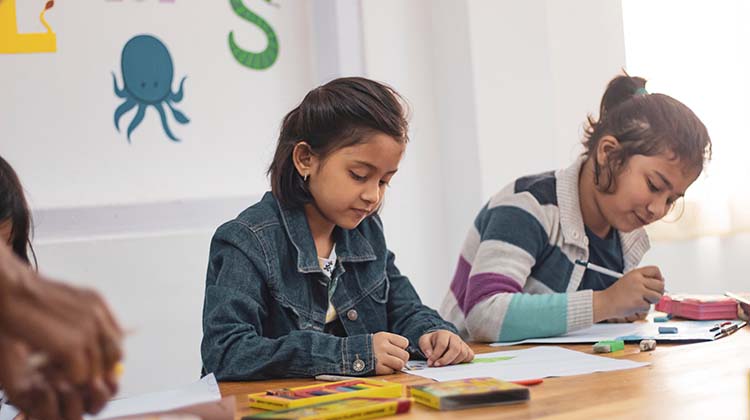Sensory strategies in the classroom

What comes to mind when you visualise a classroom? The posters on the wall, the chitter chatter of students, desks with colourful pencils, children’s artwork?
For a student with sensory processing challenges, these things can all be very distressing and get in the way of their learning.
Sensory processing refers to the way the body sorts, interprets, and responds to information from the senses. For those with sensory processing challenges, interpreting and organising sensory input can be difficult, often leading to undesirable social-emotional and behavioural responses.
So how do we support students with sensory processing challenges to engage in the classroom?
The kid who ‘won’t sit still’
This student is a movement seeker. They will usually enjoy vestibular, movement, and proprioceptive input.
We can help this student by:
- Allowing time for movement activities such as animal walks
- Encouraging the child to engage in heavy-work activities such as wall push-ups, carrying heavy items, jumping, wall sits, yoga poses etc
- Considering dynamic seating options such as the ‘Disc’o’Sit’ movement cushion, Hokki Stool, etc
- Alternate between sitting and standing for completion of work task.
The kid who is ‘distracted by everything’
This student is a sensory seeker. They will usually enjoy visual input and look at everything in the room.
We can help this student by:
- Decreasing environmental distractions by reconsidering complicated prints and patterns on clothing, walls, and floors
- Decreasing distracting visual clutter on the students’ desk
- Simplifying class worksheets
- Meeting their need for visual input by providing visually stimulating activities e.g. sensory bottles at specific times, when/ as appropriate.
The kid who ‘can’t see what’s right in front of them’
This student has low registration of visual input, meaning that they find it difficult to ‘filter out’ the unimportant visual information they are receiving in order to concentrate where they need to.
We can help this student by:
- Utilise a viewing window on worksheets and in text to minimise unnecessary visual input on the page
- Decreasing visual clutter on the students’ desk
- Simplifying worksheets
- Using slope boards to elevate work and bring work into view.
The kid who ‘is off with the fairies’
This student has low registration of general sensory input. These children benefit from alerting sensory activities that can ‘wake up’ the sensory systems and become more alert and attentive.
We can help this student by:
- Providing movement breaks between activities;
- Use dynamic seating options such as the ‘Disc’o’Sit’ movement cushion, Hokki Stool, etc
- Complete whole-class movement activities such as yoga;
- Regular check in with student to gauge attention.
The kid who ‘loses it for no obvious reason’
This student has a strong social-emotional response to sensory input.
We can help this student by:
- Considering potential behavioural motives for the meltdown and provide a strategy
- Utilise ‘first, then’ terminology to provide clear guidelines about what is expected in the immediate future and outcome of completing tasks in required order e.g. first finish your puzzle, then we go out to the playground
- Use a picture schedule or checklist for activity or schedule changes
- Increase predictability in the sensory environment, for example, warning the student before the school bell rings.
The kid who ‘tries so hard to keep it together but loses it at the end of the day’
This student looks like they are absolutely fine and paying attention. They may even look like they are enjoying their day, however when they get home, their parents report that their child is ‘losing it’. These students also have a strong social-emotional response to sensory input, however are typically good at modulating their sensory environment to enable them to get through the day, but there is a limit to how long they can hold it together. The effort is exhausting from them.
We can help this student by:
- Building in regular opportunities into the day for debriefing and decompressing
- Provide the student with the opportunity to tell you if they need a break such as providing an exit card or other cue
- Check in with parents to see if they have any issues at home if you are aware of any previous concerns
- Monitor for signs of discomfort, which may look like fidgeting, decreased attention, restlessness, etc.
We will be presenting a session at the Additional Needs Symposium, National Education Summit Brisbane on 15 & 16 May 2020 at the BCEC.
If you have any further concerns regarding a student in your classroom, please seek advice from an Occupational Therapist.